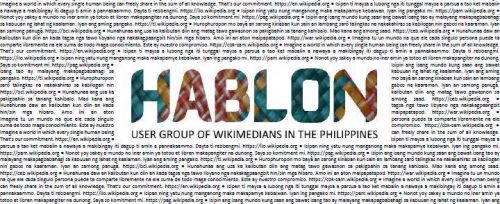Difference between revisions of "Hablon:About us"
Jump to navigation
Jump to search
| (7 intermediate revisions by the same user not shown) | |||
| Line 7: | Line 7: | ||
A ''user group'' is defined as a group of individuals who have the same interests and use a particular product or service,<ref>{{cite web|url=https://www.collinsdictionary.com/dictionary/english/user-group|title=Definition of ''user group''|publisher=Collins Dictionary}}</ref> thus, we are a group of individuals who promote free knowledge through Wikipedia and its sister projects. | A ''user group'' is defined as a group of individuals who have the same interests and use a particular product or service,<ref>{{cite web|url=https://www.collinsdictionary.com/dictionary/english/user-group|title=Definition of ''user group''|publisher=Collins Dictionary}}</ref> thus, we are a group of individuals who promote free knowledge through Wikipedia and its sister projects. | ||
| − | ''Hablon'' is a [[wikipedia:en:Visayan_languages|Bisaya]] word which means either "weaver" or "something woven".<ref>{{cite web|url=https://www.iloilometropolitantimes.com/innovation-can-save-hablon-industry-in-iloilo/|title=Innovation can save hablon industry in Iloilo|date=2018-07-12|publisher=''Iloilo Metropolitan Times''|last=Nepomocen|first=Jezza|archive-url=https://web.archive.org/web/20180718073736/https://www.iloilometropolitantimes.com/innovation-can-save-hablon-industry-in-iloilo/|archive-date=18 July 2018}} - Meaning of ''hablon'' in [[wikipedia:en:Hiligaynon_language|Hiligaynon language]].</ref><ref>[http://www.binisaya.com/cebuano/hablon Binisaya.com] - Meaning of ''hablon'' in [[wikipedia:en:Cebuano_language|Cebuano language]].</ref><ref>[http://diksyonaryowaray.blogspot.com/2011/04/h.html diksyonaryowaray.blogspot.com] - Meaning of ''hablon'' in [[wikipedia:en:Waray_language|Waray language]].</ref> Bisaya is the second among the languages in the Philippines that most Filipinos speak.<ref>{{cite web|url=http://nap.psa.gov.ph/sexystats/2013/SS20130830_dialects.asp#tab1|title=Many Voices, One Nation: The Philippine Languages and Dialects in Figures|archive-url=https://web.archive.org/web/20180813020556/http://nap.psa.gov.ph/sexystats/2013/SS20130830_dialects.asp|archive-date=2018-08-13|date=2013-08-30|last=Albert|first=Jose Ramon G.|publisher=[[wikipedia:en:Philippine_Statistics_Authority|Philippine Statistics Authority]]}}</ref> Filipinos, especially indigenous Filipinos, are weavers. <ref>https://tribune.net.ph/index.php/2018/10/01/the-stunning-craftsmanship-of-filipino-weavers/</ref> As | + | ''Hablon'' is a [[wikipedia:en:Visayan_languages|Bisaya]] word which means either "weaver" or "something woven".<ref>{{cite web|url=https://www.iloilometropolitantimes.com/innovation-can-save-hablon-industry-in-iloilo/|title=Innovation can save hablon industry in Iloilo|date=2018-07-12|publisher=''Iloilo Metropolitan Times''|last=Nepomocen|first=Jezza|archive-url=https://web.archive.org/web/20180718073736/https://www.iloilometropolitantimes.com/innovation-can-save-hablon-industry-in-iloilo/|archive-date=18 July 2018}} - Meaning of ''hablon'' in [[wikipedia:en:Hiligaynon_language|Hiligaynon language]].</ref><ref>[http://www.binisaya.com/cebuano/hablon Binisaya.com] - Meaning of ''hablon'' in [[wikipedia:en:Cebuano_language|Cebuano language]].</ref><ref>[http://diksyonaryowaray.blogspot.com/2011/04/h.html diksyonaryowaray.blogspot.com] - Meaning of ''hablon'' in [[wikipedia:en:Waray_language|Waray language]].</ref> Bisaya is the second among the languages in the Philippines that most Filipinos speak.<ref>{{cite web|url=http://nap.psa.gov.ph/sexystats/2013/SS20130830_dialects.asp#tab1|title=Many Voices, One Nation: The Philippine Languages and Dialects in Figures|archive-url=https://web.archive.org/web/20180813020556/http://nap.psa.gov.ph/sexystats/2013/SS20130830_dialects.asp|archive-date=2018-08-13|date=2013-08-30|last=Albert|first=Jose Ramon G.|publisher=[[wikipedia:en:Philippine_Statistics_Authority|Philippine Statistics Authority]]}}</ref> Filipinos, especially indigenous Filipinos, are weavers. <ref>{{cite web|url=https://tribune.net.ph/index.php/2018/10/01/the-stunning-craftsmanship-of-filipino-weavers/|first=Wrenn|last=Sanchez|date=1 October 2018|title=The stunning craftsmanship of Filipino weavers|publisher=[[wikipedia:en:Daily Tribune (Philippines)|The Daily Tribune]]}}</ref> As Filipino weavers use fibers and threads to illustrate the culture of the Philippines in their textiles, HUG strives to interlace small bits of information to form knowledge and to make these knowledge accessible to everyone through Wikimedia projects.<ref>{{cite web|url=https://www.manilatimes.net/weaving-the-philippines-local-textures-and-fabrics/108502/|title=Weaving the Philippines Local textures and fabrics|publisher=''[[wikipedia:en:The_Manila_Times|The Manila Times]]''|date=2014-07-02}}</ref> |
|body= | |body= | ||
| + | {{TOC right}} | ||
== Background == | == Background == | ||
| Line 174: | Line 175: | ||
---- | ---- | ||
;Notes: | ;Notes: | ||
| − | :a.{{note|id1}} UPVTC = [[wikipedia:en:University_of_the_Philippines_Visayas_Tacloban_College University of the Philippines Visayas Tacloban College]; | + | :a.{{note|id1}} UPVTC = [[wikipedia:en:University_of_the_Philippines_Visayas_Tacloban_College|University of the Philippines Visayas Tacloban College]]; |
:b.{{note|id2}} SBWC = [https://web.archive.org/web/20170314034952/http://www.wikimedia.org.ph/wmph/Resolution:Recognition_of_Sinirangan_Bisaya_Wikimedia_Community Sinirangan Bisaya Wikimedia Community]; | :b.{{note|id2}} SBWC = [https://web.archive.org/web/20170314034952/http://www.wikimedia.org.ph/wmph/Resolution:Recognition_of_Sinirangan_Bisaya_Wikimedia_Community Sinirangan Bisaya Wikimedia Community]; | ||
| − | :c.{{note|id3}} WMPH = [[metawikimedia:Wiki_Society_of_the_Philippines | + | :c.{{note|id3}} WMPH = [[metawikimedia:Wiki_Society_of_the_Philippines|Wikimedia Philippines]]; |
:d.{{note|id4}} PHILACI = Philippine Association of Court Interpreters; | :d.{{note|id4}} PHILACI = Philippine Association of Court Interpreters; | ||
:e.{{note|id5}} AGIO = Association of Government Information Officers of Eastern Visayas Region; | :e.{{note|id5}} AGIO = Association of Government Information Officers of Eastern Visayas Region; | ||
Revision as of 09:07, 20 October 2022
| Home | Who we are | Activities | Reach us | Help us |
What we do
The activities in which these Wikimedians participated in, organized and conducted are as follows:
- Notes
- a.^ UPVTC = University of the Philippines Visayas Tacloban College;
- b.^ SBWC = Sinirangan Bisaya Wikimedia Community;
- c.^ WMPH = Wikimedia Philippines;
- d.^ PHILACI = Philippine Association of Court Interpreters;
- e.^ AGIO = Association of Government Information Officers of Eastern Visayas Region;
- f.^ CPU = Computer Professionals' Union;
- g.^ MAWF = Maharlika Artists and Writers Federation;
- h.^ NPC-Tac = National Press Club - Tacloban;
- i.^ JCI = Junior Chamber International, Philippines;
- j.^ PSHS-EV = Philippine Science High School Eastern Visayas Campus;
- k.^ PhilWiki Community = Philippine Wikimedia Community User Group;
- l.^ Conference reports of HUG representatives can be read here and here
- m.^ WMF = Wikimedia Foundation
- n.^ Report on conference participation can be read here
- o.^ Organized by 170+Talaytayan MLE and endorsed by UNESCO Bangkok
- p.^ Organized and sponsored by Wikimedia Indonesia and Wikimedia Foundation and held in Bali, Indonesia in 2018
- q.^ Organized by and held at the Agusan del Sur State College of Agriculture and Technology;
- r.^ The Aboriginal Education World is a bimonthly periodical of the Center for Aboriginal Languages, Cultures and eDucation, Center for Aboriginal Studies, National Chengchi University in Taipei City in Taiwan
References
- ↑ "Definition of user group". Collins Dictionary.
- ↑ Nepomocen, Jezza (2018-07-12). "Innovation can save hablon industry in Iloilo". Iloilo Metropolitan Times. Archived from the original on 18 July 2018. - Meaning of hablon in Hiligaynon language.
- ↑ Binisaya.com - Meaning of hablon in Cebuano language.
- ↑ diksyonaryowaray.blogspot.com - Meaning of hablon in Waray language.
- ↑ Albert, Jose Ramon G. (2013-08-30). "Many Voices, One Nation: The Philippine Languages and Dialects in Figures". Philippine Statistics Authority. Archived from the original on 2018-08-13.
- ↑ Sanchez, Wrenn (1 October 2018). "The stunning craftsmanship of Filipino weavers". The Daily Tribune.
- ↑ "Weaving the Philippines Local textures and fabrics". The Manila Times. 2014-07-02.
- ↑ Nazareno, Eileen (2015-08-05). "A Virtual Pool of Free Knowledge on Eastern Visayas". The Freeman. Archived from the original on 2015-08-05 – via The Philippine Star. - (A news article about the 2nd Waray Wikipedia Edit-a-thon.)
- ↑ Nazareno-Ballesteros, Eileen (2015-12-01). "Regional assembly of court interpreters: Leyte governor, Palo mayor outline need for human resources improvement". The Freeman. Archived from the original on 2015-12-12 – via The Philippine Star. - (A news article about the regional assembly of PHILACI and the participation of Wikimedia and SBWC at their event.)
